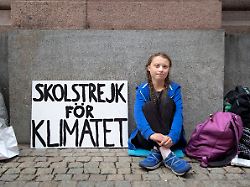Five years climate strike
How Fridays For Future changed the world
08/20/2023, 09:16 am
Greta Thunberg’s first school strike was five years ago. Since then, the climate crisis has received much more attention around the world. The form of the protest has also changed. But some see the acceptance of climate protection at risk.
It was a small action that turned out to be huge: On August 20, 2018, a Swedish girl sat down in front of the Reichstag in Stockholm to demand more climate protection from her country’s politicians. The then 15-year-old Greta Thunberg struck a chord internationally: The idea of the climate protest quickly spilled over to Germany and the rest of the world, where millions of people took to the streets for stronger climate protection. The climate movement Fridays for Future was born – and Thunberg became the climate conscience of the world, she met Obama, Merkel, Schwarzenegger.
The beginning of these protests – Thunberg’s world-famous “school strike for the climate” – is now five years ago. “I didn’t expect so much attention. It’s gotten pretty big,” said Thunberg just a few months after the strike began.
It got a lot bigger. The idea took off particularly well in Germany. “We’re here, we’re loud because you’re stealing our future,” shouted thousands upon thousands of demonstrators, mostly young, at major climate protests in Berlin, Hamburg and dozens of other cities. With consequences: Many advances in climate protection have only become possible in this country thanks to the pressure generated by Fridays for Future. For example, the phase-out of coal, which was brought forward to 2030, or the judgment of the Federal Constitutional Court in 2021, which ordered the federal government to improve the Climate Protection Act.
Support for the climate movement halved
In general, climate protection is receiving much more attention today in German and international politics than it was in 2018. And hardly any company can avoid making a commitment to climate and sustainability in some way – even if some are accused of greenwashing. “Fridays for Future has turned the climate crisis from a niche problem into a societal problem and won majorities for real solutions on a historic scale,” says leading German climate activist Luisa Neubauer. It has also been shown “that young people can develop unimagined power together,” said the 27-year-old.
How urgent climate protection is is shown again in the form of a number of extreme weather events. They range from floods in Norway, Slovenia and Austria to heat waves in southern Europe. “This year and especially this summer, the summer of 2023, must be a turning point for European action against the climate catastrophe,” demanded Neubauer in the Slovenian capital Ljubljana. “We demand that European leaders wake up to this crisis.” Neubauer, Thunberg and Co. have made this demand again and again – that the climate crisis must finally be treated as a crisis by politics, business and the media. Things are not progressing as quickly as they and many scientists are demanding.
This has prompted some climate protection activists to take more drastic action: activists from the last generation keep blocking roads in Germany and sticking themselves to well-known works of art, in other countries activists also disrupt major events. They consider such forms of protest necessary to make society aware of the urgency of the climate crisis – but it is questionable whether they will help or harm their cause. According to a survey by the non-profit organization More in Common, the social image of the climate movement has recently changed noticeably.
Latif: “The word climate protection is burned”
The basic support for the climate and environmental movement in Germany has halved from 68 to 34 percent from 2021 to today. The road blockades in particular are widely viewed critically – despite the fact that many people recognize the fundamental need for strong climate protection. “It is possible for many people to reject the specific protests in their design and still know about the importance of climate commitment,” emphasized the organization.
So is society over with the actions? At least the term “climate protection” no longer evokes only positive associations. “The word climate protection is burned out,” climate researcher Mojib Latif recently told the “Neue Osnabrücker Zeitung”. The protests of the last generation are just as “counterproductive” as the discussion about the heating law. “When people hear the word climate protection, the alarm bells go off,” he said. Above all, politicians from the SPD, Union and FDP have sharply criticized the last generation and some branded their members as criminals.
After these sharp attacks, the Fridays for Future activist Neubauer expressed her disillusionment with the ongoing political resistance. “It’s frustrating to see that various political representatives still prefer to insult climate activists and prevent climate progress instead of acknowledging that the climate movement only needs it because they haven’t done their job in recent decades,” she says.
Thunberg fined
The German Climate Protection Act provides for a 65 percent reduction in climate-damaging emissions by 2030 compared to 1990. They are to be reduced by 88 percent by 2040 and greenhouse gas neutrality is to be achieved by 2045. Fridays for Future continues to work to ensure that the federal government keeps its climate promises independently – and “that we are no longer needed,” as Neubauer says. And Thunberg? The young girl with the Pippi Longstocking braids has long since grown into a grown woman. Almost four weeks ago, the 20-year-old was fined in Sweden for not following police instructions during a climate protest at the Malmö oil port.
In addition, she successfully finished school this summer – her “school strike” is technically over, but her Friday climate protest is not at all. On September 15, she will again receive support from all over the world: That’s when Fridays for Future plans the next global climate protests – on a Friday, of course. It will also be about getting the masses enthusiastic about climate protection again.
